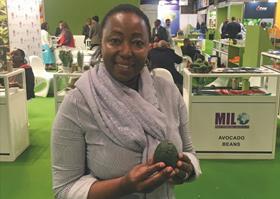
At Karakuta Farm in Juja, located north of Nairobi, the avocado is rapidly becoming a valuable tool for the empowerment of Kenyan women, providing greater financial independence and helping to bring local communities together.
With assistance from the SheTrades Commonwealth programme, Karakuta Farm is making progress, despite the additional challenges presented by the Covid-19 crisis. “Local communities are getting involved, and as the word gets around, more and more women are interested,” says CEO Grace Ngungi. “We’ve seen big expansion to different wards and villages beyond our farms.”
Ngungi explains that Karakuta gives women an important independent source of income. “They can sell to us, we negotiate good prices for them, and this gives them a livelihood that is theirs,” she says. “We supply them with trees and offer them an attractive buy-back scheme. That way, they don’t feel compelled to sell the fruit to a broker before it is the right time to pick. This also improves the overall quality, helping the image of Kenya as a producer of high-quality avocados. So our scheme really gets to the root cause of these problems and mitigates them.”
Demand for avocados has remained strong throughout the pandemic, Ngungi says, in stark contrast to the market for herbs. “The herb market collapsed following the closure of many hotels, restaurants and cafeteria due to lockdowns,” she reveals. “For avocados the market has been better. Demand is still greater than what we can supply.”
Post-Covid, Ngungi believes it’s important to have a very strict traceability system. “We are developing our own app to map every farmer in our CSR programme,” she reveals. “In the event that we start selling directly to the market, the produce will be traceable so customers and consumers can see where and how it was grown, and what chemicals were used. We want to build a trusted brand and show off the quality that this group of growers is capable of. We sell together to give our customers value, in terms of quality, volume and transparency. We can predict our volumes going forward, which is useful for buyers.”
This is being made harder by the changing climate. “This year, instead of three months of rain, we had around two weeks to one month,” says Ngungi. “And these were supposed to be the long rains. We are therefore expecting drought until 2022.”
And of course, a lack of water can affect the quality of the fruit going forward. “There are times that you really need to water the trees,” she explains, “such as immediately after harvesting in order to encourage root development and new leaf growth and apply fertiliser.”
Around 90 per cent of Karakuta’s avocados go to the UK, according to Ngungi. “Germany is also an attractive market that pays well,” she says, “so we are on the lookout in both countries for reliable buying partners that we can work with for the long term.”



